DAY 14 PRAYER INTENTION: Today, pray for all victims of fraud, all those who have lost goods or properties in one way or the other; all those who have charitably lent money and expecting a payback but their debtors appear to have absconded. May they be visited, supported and graced by Our Lady, Queen of Virgins, and may they recover all they had lost, to the greater glory of God. Amen (Also add your own intention…)
Now, say the 20 decades of the Rosary…
At the end of the 20 decades, say the following Prayers:
Hail Holy Queen
Hail, holy Queen, mother of mercy, our life, our sweetness, and our hope. To thee do we cry, poor banished children of Eve. To thee do we send up our sighs mourning and weeping in this valley of tears. Turn then, most gracious advocate, thine eyes of mercy toward us, and after this our exile show us the blessed fruit of thy womb, Jesus. O clement, O loving, O sweet Virgin Mary!
Pray for us, O Holy Mother of God, that we may be made worthy of the promises of Christ.
Let us pray
O God, whose only begotten Son, by His life, death, and resurrection, has purchased for us the rewards of eternal salvation. Grant, we beseech Thee, that while meditating on these mysteries of the most Holy Rosary of the Blessed Virgin Mary, we may imitate what they contain and obtain what they promise, through Christ our Lord. Amen.
Most Sacred Heart of Jesus, have mercy on us! Immaculate Heart of Mary, pray for us! St. Joseph, pray for us!
Litany of Loreto
Lord have mercy.
Christ have mercy.
Lord have mercy.
Christ hear us.
Christ graciously hear us.
God, the Father of heaven,
have mercy on us (Repeat after each invocation)
God the Son, Redeemer of the world,
God the Holy Spirit,
Holy Trinity, one God,
Holy Mary,
pray for us (Repeat after each invocation)
Holy Mother of God,
Holy Virgin of virgins,
Mother of Christ,
Mother of the Church,
Mother of Mercy,
Mother of divine grace,
Mother of Hope,
Mother most pure,
Mother most chaste,
Mother inviolate,
Mother undefiled,
Mother most amiable,
Mother most admirable,
Mother of good counsel,
Mother of our Creator,
Mother of our Saviour,
Virgin most prudent,
Virgin most venerable,
Virgin most renowned,
Virgin most powerful,
Virgin most merciful,
Virgin most faithful,
Mirror of justice,
Seat of wisdom,
Cause of our joy,
Spiritual vessel,
Vessel of honour,
Singular vessel of devotion,
Mystical rose,
Tower of David,
Tower if ivory,
House of gold,
Ark of the covenant,
Gate of heaven,
Morning star,
Health of the sick,
Refuge of sinners,
Solace of Migrants,
Comfort of the afflicted,
Help of Christians,
Queen of Angels,
Queen of Patriarchs,
Queen of Prophets,
Queen of Apostles,
Queen of Martyrs,
Queen of Confessors,
Queen of Virgins,
Queen of all Saints,
Queen conceived without original sin,
Queen assumed into heaven,
Queen of the most Holy Rosary,
Queen of families,
Queen of peace.
Lamb of God, who takes away the sins of the world,
spare us, O Lord.
Lamb of God, who takes away the sins of the world,
graciously hear us, O Lord.
Lamb of God, who takes away the sins of the world,
have mercy on us.
Pray for us, O holy Mother of God.
That we may be made worthy of the promises of Christ.
Let us pray
Grant, we beseech thee, O Lord God, that we, your servants, may enjoy perpetual health of mind and body;
and by the glorious intercession of the Blessed Mary, ever Virgin, may be delivered from present sorrow, and obtain eternal joy. Through Christ our Lord. Amen.
Memorare
Remember, O most gracious Virgin Mary, that never was it known that anyone who fled to thy protection, implored thy help, or sought thine intercession was left unaided. Inspired by this confidence, I fly unto thee, O Virgin of virgins, my mother; to thee do I come, before thee I stand, sinful and sorrowful. O Mother of the Word Incarnate, despise not my petitions, but in thy mercy hear and answer me.
Prayer to Saint Joseph after the Rosary
To you, O Blessed Joseph, we come in our trials, and having asked the help of your most holy spouse, we confidently ask your patronage also. Through that sacred bond of charity which united you to the Immaculate Virgin Mother of God and through the fatherly love with which you embraced the Child Jesus, we humbly beg you to look graciously upon the beloved inheritance which Jesus Christ purchased by his blood, and to aid us in our necessities with your power and strength.
O most provident guardian of the Holy Family, defend the chosen children of Jesus Christ. Most beloved father, dispel the evil of falsehood and sin. Our most mighty protector, graciously assist us from heaven in our struggle with the powers of darkness. And just as you once saved the Child Jesus from mortal danger, so now defend God’s Holy Church from the snares of her enemies and from all adversity. Shield each one of us by your constant protection, so that, supported by your example and your help, we may be able to live a virtuous life, die a holy death, and obtain eternal happiness in heaven. Amen.
Prayer to Saint Michael the Archangel
St. Michael the Archangel, defend us in battle, be our protection against the wickedness and snares of the devil. May God rebuke him we humbly pray; and do thou, O Prince of the Heavenly host, by the power of God, cast into hell Satan and all the evil spirits who prowl about the world seeking the ruin of souls. Amen.
DAY 14 REFLECTION: “QUEEN OF VIRGINS” (REGINA VIRGINUM)
The seventh of the twelve invocations of Mary as “Queen” in her litany, praises her as “Queen of Virgins,” (Latin, Regina Virginum). This is quite similar to one of her titles – “Holy Virgin of virgins.” In addressing our Lady as “Queen of Virgins”, we must first understand clearly and clarify the misconceptions and objections surrounding the doctrine of her perpetual virginity. How could the Permanent Virginity of Mary be understood in the light of Sacred Scripture and in the writings of the Church fathers? Did Mary lose her virginity with the birth of her Son? Did St. Joseph have sexual relations with her after the birth of Christ? These shall be our points of reflection for this fourteenth day of our October Devotion.
To begin with, after the apostles, martyrs, and confessors of the faith in the early days of Christianity, people who opted for the state of life that Jesus chose began to be recognized for their vocation. Those who did not marry but chose to dedicate themselves entirely to the community, to the Gospel, to the poor, were known as “consecrated virgins.” These drew inspiration from their Queen – the great Mother of God, Mary ever-virgin.
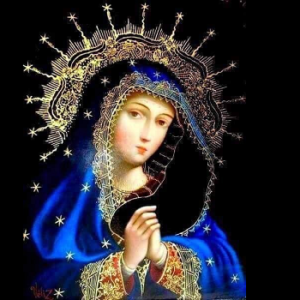
The Church has always professed that Mary was a virgin “antepartum, in partu, et postpartum,” i.e., before birth, during birth, and after the birth of Christ, as far back as the second century A.D, clearly seen in the writings of many of the early Church Fathers – St. Augustine, Pope St. Leo the Great, St. Peter Chrysologus, St. Gregory Nyssa, St. Gregory Nazianzus, etc. Scripture tells us that Mary conceived Jesus in her womb “by the power of the Holy Spirit” without loss of her virginity. She remained a virgin in giving birth to Jesus; His miraculous birth did not diminish her virginal integrity but sanctified it (cf. Vatican II, Lumen Gentium, no. 57). Following the birth of Jesus, Mary remained a virgin for the rest of her earthly life, until she was taken body and soul into heaven, where she reigns as Queen (cf. Lumen Gentium, no. 59). The Catechism of the Catholic Church, quoting St. Augustine, says: “Mary remained a virgin in conceiving her Son, a virgin in giving birth to Him, a virgin in carrying Him, a virgin in nursing Him at her breast, always a virgin” (CCC #510).
Mary’s virginity “antepartum” (prior to the birth of Christ) is apparent from the Gospels of Matthew and Luke, where she is clearly identified as “a virgin” (cf. Luke 1:26-27, Matthew 1:18). Moreover, when Archangel Gabriel announced to Mary that she would be the mother of the Messiah, she responded, “How can this be since I do not know a man?” indicating her virginity. St. Matthew describes the virginal conception as a fulfilment of the prophecy of Isaiah 7:14: “The virgin shall be with child, and give birth to a son, and they shall call him Emmanuel.”
The Church’s teaching on Mary’s virginity “in partu” (during the birth of Christ) and the “miraculous birth” indicates that she was not violated physically. This is important because the virginity of Mary “in partu” ‘protects’ the miraculous nature of birth, in turn, the miraculous birth points to the integrity that goes beyond the mere absence of sexual relations, and which further is a sign of Mary’s interior virginity. There are several Old Testament imageries that support the virginity in partu. St. Ambrose refers to Mary as the east gate of Ezekiel; it says: “Then, He brought me back to the outer gate of the sanctuary which faces toward the EAST, but it was shut. And the Lord said to me: ‘This gate shall be shut; it shall not be opened, and no man shall enter by it, because the Lord God of Israel has entered by it; therefore it shall be shut’” (Ezekiel 44:1-2). Also, Isaiah 66:7 refers to the delivery of a male child born without labour pains. Lastly, there is a reference in the Song of Songs (4:12) to the bride being an enclosed garden and a sealed fountain. It is pertinent to note that Mary wrapped the Child in swaddling clothes (cf. Lk. 2:7) and laid Him in a manger, which indicates the absence of the usual pains and infirmities of childbirth.
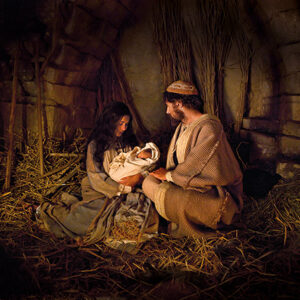
Mary’s Virginity post-partum (after the birth of Christ) is apparently the most difficult to understand and accept ranging from confused Catholics and non-Catholics alike, as such there have been persistent arguments in this regard. The most persistent objections to Mary’s virginity post-partum is, first, the frequent scriptural references to Jesus’ “brothers” and sisters (cf. Matthew 13:55, Mark 3:31-35, Luke 8:20, John 2:12 and 7:3-5, Acts 1:14, Galatians 1:19 1Corinthians 9:5). Nevertheless, the Church clarifies (based on Scripture) that the Greek word “brother” in English (i.e., adelphos) can be used to designate not only a blood brother but can also denote varying and even remote degrees of relationship. “Adelphos” (i.e., “brother”), standing alone, is thus inconclusive on the point. Further examination of the biblical texts alone reveals that these purported “brothers” were not the children of Mary. Indeed, nowhere in Scripture is the Blessed Virgin Mary ever explicitly identified as the earthly mother of anyone other than Jesus. There is an additional argument that the “brothers” appear to be older than Jesus, and there is ample scriptural support for the proposition that Mary had no children before Jesus (e.g., Matthew 1:18-25, Luke 1:26-38 and 2:7). The same goes for “sister” (in Greek adelphe) and the plural form “brothers” (adelphoi). The Old Testament (written originally in Hebrew) also shows that the word “brother” has a wide semantic range of meaning and could refer to any male relative from different parents, just as we still apply in our respective cultures in Nigeria… etc. In the Old Testament, Lot, for example, is called Abraham’s “brother” (Gen. 14:14), even though, being the son of Haran (the brother of Abraham) (Gen. 11:26–28), Lot was actually Abraham’s nephew. Similarly, Jacob is called the “brother” of his uncle Laban (Gen. 29:15) etc. This is so because neither Hebrew nor Aramaic had a special word meaning “cousin,” etc. Hence, speakers of those languages could use either the word “brother” or a circumlocution, such as “the son of my uncle.” However, circumlocutions are clumsy, so the Jews often used “brother” or “sister” (where it applies). In the same vein, the writers of the New Testament imported the Hebraic/Aramaic sentiment of the use of “brothers” and “sisters” when they wrote in Greek. In other words, they did the same thing the translators of the Greek Septuagint did. That is, translating the Old Testament from Hebrew to Greek, the Jewish translators grouped the idea of cousin, nephew, niece, etc. to mean brother (ἀδελφός – adelphos) as indicated in the Hebrew Bible, inasmuch as the Greek language has a separate word for cousin (anepsios). Put differently, the translators of the Greek Septuagint used adelphos, even for true cousins. It is interesting to note that these so-called “brothers” (adelphos) of Jesus – James, Joseph, Simon, and Jude are pictured at the crucifixion scene (in Matthew 27:56) as the children of other women. This becomes clearer when we cross-reference it with John 19:25, which says: “at the cross were present the mother (Mary) of Jesus, and her sister, Mary (the wife of Clopas), and Mary of Magdala”. That is, 3 Marys at the foot of the cross! Why is this significant? Mary the wife of Clopas is known as the mother of James and Joseph (or Joset), and John says she is the sister of Mary the mother of Jesus (in the real sense, sister-in-law). Therefore, when we combine all these, it becomes obvious that these “brothers” are certainly the cousins of Jesus. It is interesting to note that none of these so-called brothers and sisters of Jesus was referred to as the child/children of Mary or Joseph in the bible; Mary and Joseph at different times were referred to as the parents of Jesus alone. When the Holy family returned from Egypt, nothing was mentioned of Jesus’ brothers; instead, we hear of Joseph, Mary, and the Child. (Mt. 2:19-20). Likewise, when the parents of Jesus searched for Jesus for three days, nothing was said of his brothers. At this time, he was already twelve years. (cf. Lk. 2:41-52). Before his death, in John 19:26, Jesus gives his mother to the Apostle John. If Jesus had blood brothers, then, it would violate Jewish customs that the next son in line would have to care for the mother. Being the only son, Jesus made sure that Mary was taken care of by a non-blood brother: the apostle John (brother of James). Therefore, this proves that Matthew 13:55-56 in no way demonstrates that Mary had other children.
Another objection is the reference to Christ as being a “firstborn” son, which indicates that they could be a second, third and so on. However, St. Jerome convincingly responds that every “only child” is a firstborn child, and he further explains that the Jewish practice was to offer sacrifice upon the birth of a “firstborn,” without the necessity of waiting for subsequent children to be born. Scripture scholars recognize that prototokos (“firstborn”) is only a legal status and only means no prior child, and it is sometimes the equivalent of monogenes (“only-born”).
Another objection, which for me, is the weakest of all, is the way the antagonists of the perpetual virginity of Mary distort the beautiful texts from the Sacred Scriptures to defend their position. Matthew says in his Gospel: “And he did not know her until he gave birth to his son” (Matthew 1: 22-25). Of the term “until”, these antagonists claim that Mary lost her virginity after giving birth to Jesus. But sincerely we all know that this was not the case, because when we say that an airline has not had accidents until today, it does not mean that tomorrow it will have an accident, but the term is used to designate only what happened. We also know that Matthew was only interested in showing in that passage that Jesus was born of a virgin, without contact from Joseph. Like the example of the airline presented above, often both in Hebrew and in the Greek of the Holy Scriptures, the terms “until” (“heus” and “heus ous”) occur to designate only what happened in the past, with no indication of what would happen in the future, but with the intention of simply changing focus. We can exemplify types of phrases that, without wanting to indicate discontinuity of action, apply the term “until”: “The Jewish authorities rejected Christ as Messiah until he was crucified.” (Which does not mean they later accepted him); “Elizabeth and Zachariah loved each other very much until they conceived John the Baptist” (which does not mean they later stopped loving each other); In these examples, the term “until” is only being used to change focus.
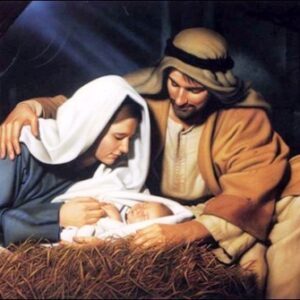
Likewise, we can find related passages in the Bible where the term “until” is not used to designate discontinuity of action: John 9:18 – “They still did not believe that he had been blind and had received his sight until they sent for the man’s parents.” – Here, the author continues, showing the unbelief of the Pharisees, which shows that the term is not even indicating discontinuity. In 1 Corinthians 15:25, we read: “For he must reign until he puts all enemies under his feet.” – Here, this passage just wanted to send a message, but if we interpret it literally, it tells us that the kingdom of Christ has ended. However, it is said in the Bible that the kingdom of Christ “will never end” (cf. Luke 1:33). Also, Matthew 28:20 reads: “Behold, I am with you always, until the end of the world.” – If we take the term “until” to mean discontinuity, then does it mean that Jesus would abandon us after the end of the world? Obviously not. Thus, the biblical passages mentioned above indicate that the “until” does not indicate discontinuity. Therefore, the phrase “And he didn’t know her until he gave birth to his son”, shows how Matthew reinforces the idea that the birth of Jesus was not due to the sexual union of Joseph and Mary, but by the power of the Holy Spirit, and even after she put to bed, Joseph still did not have carnal knowledge of her.
Another major objection is based on an inability to reconcile “post-partum” virginity with Mary and Joseph’s having a “true marriage.” Some have argued that since Catholics believe that Joseph and Mary had no sexual relations after the birth of Christ, then there was no true marriage as a result of the absence of consummation. However, that would be a misleading position because marriage involves unconditional self-giving that may be physically expressed, although not necessarily, because one may possess a right without exercising it. Consent, not consummation, is “the indispensable element that ‘makes the marriage’” (cf. Catechism, #1626). John Paul II makes it clear in his apostolic letter “Guardian of the Redeemer” (#7) that Joseph and Mary had a true marriage. A good way of understanding this kind of chaste and virgin-marriage is returning to the Bible, in Luke 1:34, the archangel Gabriel tells Mary that she is to be the Mother of the Messiah, and Mary asks, “How can this be since I know not a man?” We already found out earlier in Luke 1:27 that Mary and Joseph were betrothed to one another. So why would Mary, who already knew the facts of life at that time ask such a question if she and Joseph were already married, but not living together yet? This is most probably a vow of virginity which she did (as explained by the Church fathers). We learn from the Bible that a vow of virginity taken as a youth can even be enforced during marriage if the husband doesn’t object (cf. Numbers 30:2-7).
Having said these, it is appropriate to consider a saying from St. Jerome, one of the early fathers of the Church. He says: “You say that Mary did not continue a virgin: I claim still more that Joseph himself, on account of Mary was a virgin, so that from a virgin wedlock a virgin son was born. {Perpetual Virginity of Blessed Mary, 21 (A.D. 383)}.
Therefore, in remaining perpetually a virgin, Mary becomes a model for all those who follow the path of virginity; little wonder she is fittingly called “Queen of virgins.” In conclusion, we must note that Mary’s Perpetual Virginity is not only an exhortation to imitate Mary’s charity, discipleship, fidelity, continence, etc. (cf. Lumen Gentium, nos. 63-64), but also highlights the uniqueness of the Incarnation, of God taking the initiative to recreate the human race through His Son, the New Adam, who was born of the Virgin Mary (the New Eve).
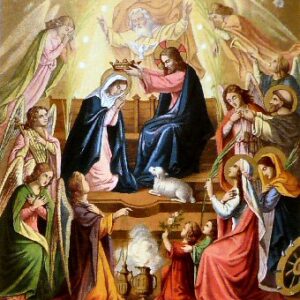
Oh “Queen of Virgins” (Regina Virginum), pray for us that we may be made worthy of the promises of Christ. Amen.
Blessing
Through the intercession of Our Lady of the Holy Rosary, may Almighty God bless + you, the Father, and the Son, and the Holy Spirit. Amen.

 Great job reflecting on Day 14! Click here for Day 15 – “Queen of All Saints”
Great job reflecting on Day 14! Click here for Day 15 – “Queen of All Saints” 

Shalom!
© Fr. Chinaka Justin Mbaeri, OSJ
Paroquia Nossa Senhora de Fatima, Vila Sabrina, São Paulo, Brazil
nozickcjoe@gmail.com / fadacjay@gmail.com
___________________________________
PS: Have you prayed your Rosary today?
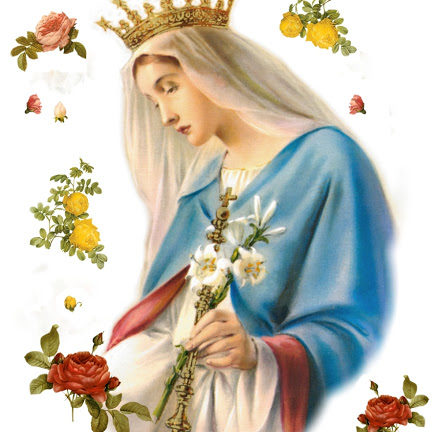


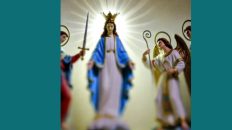


Wow!! Wow!! This is awesome.
Thanks a lot for this.
Fr please my question might sound childish but please help me. When Mary gave birth to Jesus does it mean she didn’t delivered him alone? Also was it virginal delivery?
From what I get from Padre’s write up
Jesus birth was not made known to anyone and from all indications, the birth seem not to dent any physical injury to Mary…so one can be right to say that Jesus birth was made possible by the power of the Holy spirit just as he was conceived through the same process
Very interesting,Thanks
Chiaaa…..
Padre you’re a writer
You just answered my pending questions…… The first son, and the until
…
God bless you for this knowledge shared
Thank you so much Padre
This is a solid eye opener. Thank you Padre for this great light that have illuminated my path the more.
Our Lady queen of virgins, pray for us
This is really a wonderful write up. God bless you more Padre
Very interesting. This is superbly delivered.
Unfortunately, as you pointed out, many Catholics join the non Catholics to talk anyhow they like. I once said it that I have a friend who is a Knight of St Mulumba who does not believe in Mary’s perpetual virginity referencing the passage that talked about Jesus brothers. That was many years ago.
I don’t know what his believe is now. I think I should have to tease him in other to reassess his stand. “Ndi nait nekwero na Mary bu virgin”
Mary becomes a model for all those who follow the path of virginity; little wonder she is fittingly called “Queen of virgins.” In conclusion, we must note that Mary’s Perpetual Virginity is not only an exhortation to imitate Mary’s charity, discipleship, fidelity, continence, etc.
This is more than a reflection, it is an exhaustive lecture! Thank you Padre for this wonderful teaching. May God continue to enlighten you as a defender and protector of the Faith. Amen
Oh Queen of Virgins, pray and intercede for us.
This is about the best lesson I’ve learnt, best teaching not only as the Catholic doctrine but as Biblical as it is.
Thank you Fr, I wish you more anointing and grace to function better in the ministry God has called you.
Our Mother, Queen of Virgin, pray for us Amen
Oh “Queen of Virgins” pray for us that we may be made worthy of the promises of Christ. Amen
Amen and Amen.
O Queen o Virgins pray for the grace of Chastity for your children.
Oh “Queen of Virgins”, pray for us that we may be made worthy of the promises of Christ. Amen
Most Mary ever virgin , pray for us Amen
Queen of virgins pray for us
Mother of the church, pray for us. AMEN.
Our Lady ‘Queen of Angels’ continue to intercede for us and our families, Amen!!!
Oh “Queen of Virgins” (Regina Virginum), pray for us that we may be made worthy of the promises of Christ. Amen.
Oh Queen if Virgin pray for us that we may be made worthy of the promises of Christ Amen.
Our Lady Queen of Virgins, pray for us
Thank You Lird for answered prayers
O Mary conceived without sin, pray for us who have recourse to you. Amen
Thank you Fada CJAY for this explanation, now l know more about the Perpetual virginity of our Mother Mary.
Queen of virginity,Pray for us sinners,now and at the hour of our death.
May our prayers and intentions be granted onto us through Christ our Lord Amen.
O mary conceived without original sin, pray for us who have recourse to thee
Oh Queen of Virgin, pray for us, that we may be made worthy of the promises of Christ Amen
Glory be to the Father,to the Son and to the Holy Spirit as it was in the beginning is now and ever shall be world without end. Our Lady Queen of Virgins pray for us . Thank you so much Padre for this exposé
Queen of virgins Pray for us that we may be made worthy of the promises of Christ
Oh Queen of Virgins Pray for us
Amen it is done
Our Lady Queen of Virgins…….. pray for us Amen
Our most blessed mother Mary , queen of virgin pray for us
Amen
Our Lady queen of Virgins.. pray for us
Our lady Queen of Virgins pray for us
Queen of Virgins.., pray for us
This is very interesting, insightful and mind blogging, I have continued to be blessed by this expository reflection and I’m loving every bit of it. Thank you Father for taking time to educate us, I wish I will continue to have assess to all of this piece any time I need them. Thank you once again Father. May Our Lady Queen of Virgins continue to intercede for us to God and may the Lord bless and answer our prayers through Christ our Lord Amen and Amen.
31 Chinonso C. Onyegbule 20 Decades of Rosary said to the greater glory of God Amen.
Our Lady Queen of virgins, pray for us
Queen of virgins ,pray for I and my family
Queen of Virgins intercede for us to live a chaste life always. Pray for all who are sexually abused & living with stigma.
May Our Lady queen of Virgins intercede for us in Jesus name Amen
Mary Queen of all virgins .. pray for us. May all our debtors show up to pay what they are owning in Jesus name.
Our lady queen of virgins. Pray for us
Queen of virgins, pray for us. #G63 Done
May God answer our prayers and bless the OCCF Family
Thank you Jesus, thank you my Lord.